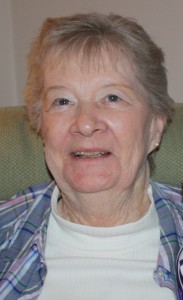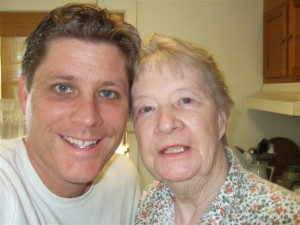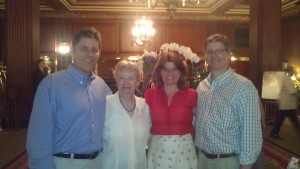
“Who says?”
With those two words, Dorothea Mae DeLoskey Baron sparked my journalism career.
It was April 1984 and toward the end of my sophomore year of high school in the south suburbs of Boston. Reading Sports Illustrated for six years had been the primary catalyst that stoked my desire to write, eventually, for the weekly newspaper in my community, the Marshfield Mariner.
The two previous high school correspondents, each of the prior two years, had been seniors. I figured it must be a senior who would be next in line, and I wasn’t yet a junior. So, I told Mom, I’d just wait my turn before approaching the newspaper.
Rather than agreeing with me or my lame rationalization, Mom’s simple challenge—who says?—gave me the gumption to take immediate action on my dream of pursuing journalism. Within a few days, I contacted the editor, Lois Martin.
“Write something for me,” Lois said.
Two days later, I turned in my first piece, a rather ambitious—and more than a little preachy—essay on collegiate athletics falling far short of attaining genuine “student athlete” ideals. Seeing my words appear in the paper, for all to see, stirred something in me that has endured more than three decades: the joy, pride and deep sense of responsibility that comes with communicating to an audience.
The interaction with Mom that kick-started my career holds two lessons that increasingly have served me over time:
Challenge assumptions.
Or “check your premises,” as Ayn Rand writes in “Atlas Shrugged.” As I like to challenge people these days, when others ask “why?” then reply with “why not?”—and vice versa. It’s all about expanding our comfort zone, and thereby making more of an impact as we grow.
You don’t need anyone else’s permission to go after your dreams.
In recent years, I have taken to telling children and young adults, in particular, that they have permission to succeed. My remarks come during some kind of mentoring moment, as they look to me for guidance on one subject or another.

It’s not that I am so special that they need me to give the permission—my point is that if they haven’t already given themselves “permission,” then I’ll gladly do it.
We are our own worst enemy, and success is as much getting out of our own way as anything else. Mom helped me get out of my own way by removing my excuse for procrastination.
Here are a few other lessons gained from Mom:
Have empathy for everybody.
Anyone who knows Mom will have to acknowledge that she has her cantankerous moments. She’s opinionated, and doesn’t hesitate to make that opinion known when she senses someone needs to hear it on a given topic.
Likewise, she has mastered the art of blending a salty adjective and a noun to create a unique nickname for people she doesn’t much care for.
Clearly, she’s not above giving her piece of mind about somebody or some situation. But when it comes to extending compassion for those who are the underdog, she’s a real softie. That probably stems, at least partly, from her own underdog status so often in life, such as the time she had a brain aneurysm and slipped into a coma.
…which leads me to another Mom lesson:
Count your blessings, and cherish each day as a gift.
Mom survived her near-death experience. I was 4 and my three siblings were 5, 6, and 8 at the time. That was more than 42 years ago and it’s impossible not to reflect at times about how our lives would have been so different, and so much more difficult, without Mom to raise us alongside Dad.
Ever since that harrowing period—more than 15,000 days later–Mom on countless occasions has attributed her continued survival to the grace of God. That spirit has rubbed off on me; I try not to take any moment for granted, because I know that I’m not promised another one, ever.

Anger, properly channeled, is a powerful force.
When she regained consciousness after about 10 days, and could barely move her body after the aneurysm, Mom had the benefit of nurses who told her that she’d probably never be able to walk again or regain many of the functions she had enjoyed her entire life.
I refer to this as a “benefit” because, regardless of whether they really meant what they said, these nurses’ grim prognosis was kerosene-on-fire motivation to Mom.
She got so ticked off that she was determined to prove them wrong. Anger is what fueled her recovery, she has always said. A nobler-sounding term would be “determination,” but Mom doesn’t much care about nobility when honesty gets the job done even better.
Laugh at yourself…often.
Mom has never taken herself too seriously. She regularly shares stories in which she plays a less-than-flattering starring role. Mishaps, misunderstandings, misstatements—all good fodder for her to poke fun at herself.
And in that special population of people who crack themselves up even before they get started telling a story, Mom is a perennial All-Star.
The ability to laugh at my own stumbles comes in handy on a regular basis. Just the other day, seated between two men on a plane ride home to Chicago, I went to take a sip of water from my bottle and managed to unleash a geyser that drenched my face and splashed the faces of both (sleeping) men.
After swiftly apologizing to them, I didn’t agonize over my innocent mistake—instead I was too focused on suppressing laughter at my latest slapstick routine. I look forward to sharing that wet vignette with Mom—and hearing her reaction.
This is the first Mother’s Day that my wife does not have her own mother to talk to. I ache for her, and count myself so fortunate that God continues to give me the gift of my encouraging, grateful, hilarious, determined, empathetic, assumption-challenging Mom.
Related Posts:
Jilted By a Journalist? Get Over It!
Making a Big Difference, Shaping the Story at Heart of PR for Entrepreneurs
